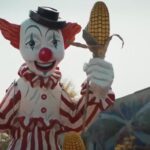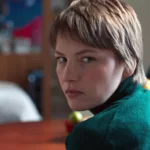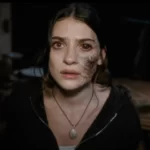Tim Finn earned his stripes as the front man and co-founder of the legendary Split Enz. When the band did indeed split, Finn released a formidable body of solo albums. He had a tenure with Crowded House where he co-wrote much of Woodface and later worked with brother Neil on a series of collaborative albums. Always looking for a creative adventure, Finn picked up a copy of Madeleine St. John’s novel, Women In Black, at an airport bookstore, and later set about developing a musical from it which became, Ladies In Black. Finn wrote the songs, while Carolyn Burns wrote the ‘stage book’ and Simon Phillips directed the production. After a superb debut, Ladies In Black is back as the opening gambit of Queensland Theatre’s 2017 season. Here Sean Sennett talks to Finn about the musical and his other recent ventures.
It must be fantastic to have Ladies in Black return and open the season for Queensland Theatre this year.
Yeah, it’s brilliant. The first piece of the puzzle was when Sydney said they would take it, and then Sue Donnelly and the team at QTC, they got behind it. It wouldn’t have been for the fainthearted trying to put together something like an east coast tour of a new musical, but the musical has proved itself in two cities.
There was a lot of confidence going forward, but it still took at pretty major leap of faith to construct this run. I’m amazed at the courage and belief that they’ve shown. It took a while for it all to line up, but here we are. We’re returning to Brisbane and Melbourne. We’ve got Sydney and then Canberra. It’s extremely exciting.
I’m wondering if the show has evolved in any way. Is it very different since it first debuted in Queensland?
No, we took three years or so to get that structure and workshopped it multiple times. We were pretty confident, but it was proved in front of an audience that it held people, and the emotional payoffs all happened at the end. There’s no need. If it ain’t broke… We had to recast five of the roles, which was Simon’s (Phillips) territory. He knows everyone and everyone wants to work with him. He just put all that together.
So it’s a different cast in Queensland this year.
The lead, Sarah Morrison, I’m happy to say that our Queensland lead is still playing Lisa. Her family, the Miles family are intact. We have a new Magda, a new Frank, a new Patty, and a new Fay … but suffice it to say that five key roles had to be recast, but they’ve got superb actors stepping in. In a way, you have to think if it’s going to have longevity it has to be able to be done by different actors, different cities, different times, different theatres. That’s the nature of the beast.
It’s a living, breathing production now that goes out into the world.
Yeah, that’s right, it does give it a kind of legitimacy and authenticity that going forward is hopefully going to continue to gather momentum and be a work that is performed throughout the years. It would be wonderful.
You performed The Fiery Maze (with words by the late poet Dorothy Porter) in Melbourne last year and earlier this in Sydney. And White Cloud was performed in Melbourne this year. Can you tell me about White Cloud?
White Cloud, I wrote that with a New Zealand playwright called Ken Duncum. Ken initially approached me probably ten years ago, and said he was curious about writing a play about a week in the life of early Split Enz, and I thought that was such a compelling idea that I kept up intermittent correspondence with him over the years.
That never eventuated, although it still might, but in the process of that relationship we talked about doing a show together that would represent something we had in common, which was basically growing up in the North Island of New Zealand, in the ’50s and ’60s, and what it means to be a Pakeha; what does Pakeha mean. It’s sort of an identity piece.
Ken’s family is six generations New Zealanders, and so he has lots of journals and memoirs he could draw from. We’ve used mum’s memoirs. I’ve written a bunch of new songs, and it’s kind of an immersive, poetic sort of take on being a New Zealander, being a Pakeha New Zealander of European descent.
We’ve added film as well. Sue Healey, a choreographer and filmmaker from New Zealand, who has lived and worked in Australia for many years, she did a beautiful edit of dad’s home movies, and some of her own dad’s. That plays behind me, and I sit there and sing these songs and read from these journals and memoirs and what Ken has written. It’s pretty cool.
You’ve obviously been so prolific with the stage, and it seems to put a real spring in your step artistically. Do you have plans to go back and do another solo record, or do you feel you’ve done that and this is the way forward for you now as an artist?
There’s enough going on now for probably ten years. I’ve got a couple of other things ticking along. This is it for now. There won’t be any solo albums. There may never be, or there might be when I’m 75 or something. I might feel like writing an album of old geezer songs. You never know, but I’m happy for the moment.
It must be very liberating to be putting your song writing talents into these projects. You’re not just coming up with ten songs for an album. You come out with 20 songs.
Yeah. Ladies in Black is 20-plus, quite a lot do end up around that mark. I think Simon said the average number of songs for a musical is about 18. It’s a longer form than an album. These days obviously, an album can be as long as you like, and people often do cram them up with bonus tracks and remixes and whatever. It’s more expansive and a chance to go into emotions, feelings, and thoughts that I have. They’re in me, but they’re difficult to embody in a personal solo album space. Also it’s a chance to look back and be nostalgic without wallowing in it, just sort of cherishing the past, and kind of using it as an inspiration is great.
Ladies In Black plays at Queensland Theatre until February 19. And tours later to Sydney, Melbourne and Canberra.




